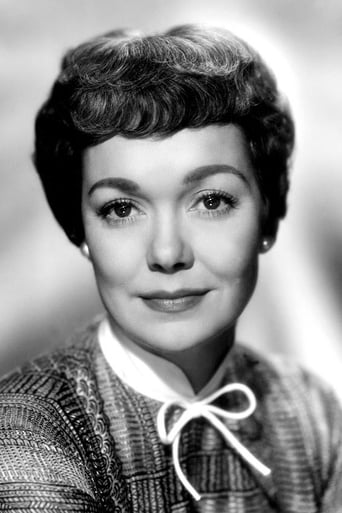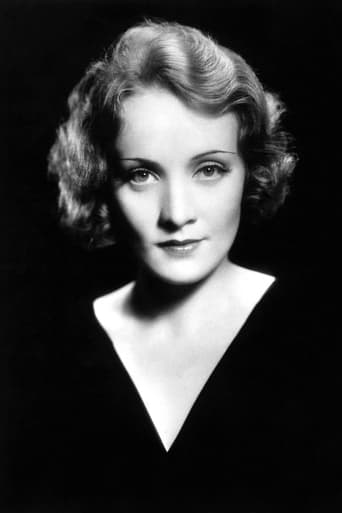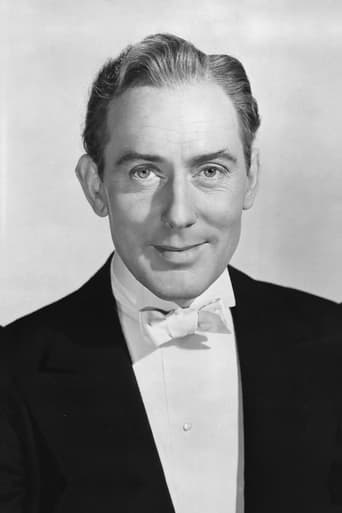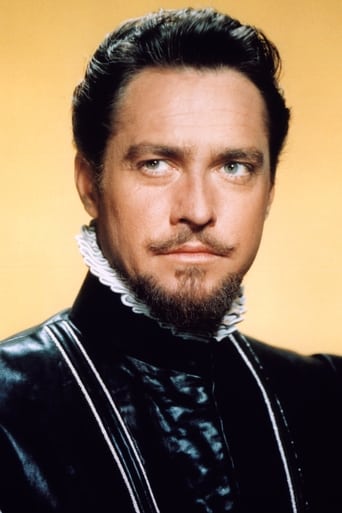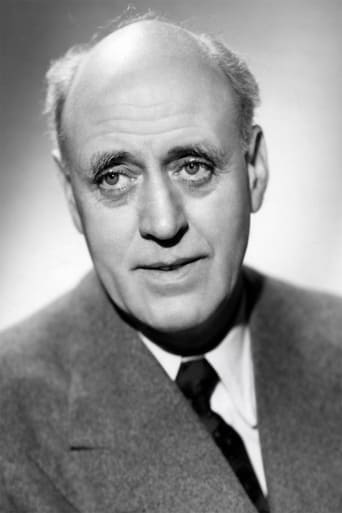Konterr
Brilliant and touching
Dynamixor
The performances transcend the film's tropes, grounding it in characters that feel more complete than this subgenre often produces.
Phillipa
Strong acting helps the film overcome an uncertain premise and create characters that hold our attention absolutely.
Scarecrow-88
Hitchcock returns to London with this nifty variation on the "wronged man" formula. Instead of the innocent man pursuing to clear his name, in this film it is a woman in love with him. Robinson (Richard Todd) goes to Eve (Jane Wyman), a theater understudy in training, about his being trouble with the law due to trying to help his lover, a renowned stage actress, Mrs. Inwood (Marlene Dietrich) cover up the murder of her abusive husband. So she convinces her father (Alistair Sim) to hide Robinson until she can prove his innocence. Deciding to "go undercover" as a lowly maid, Eve convinces Inwood's current maid, Nellie (Kay Walsh), to allow her a chance to substitute for her. But when Eve meets a detective inspector in a pub, Smith (Michael Wilding), her life will become increasingly complicated.Excellent casting (especially Sim) top to bottom, typically magnificent camera-work (elaborating in a voice that speaks volumes when characters don't talk), exceptional lighting (especially at the end when Eve and Robinson are in hiding while police look for them in an abandoned theater building), and twisty conclusion make for a real Hitchcock gem that deserves re-evaluation. It certainly turns the *wronged man* plot on its head with that ending. Dietrich gets to sing and raise her iconic eyebrows during scenes where her diva character is trying to worm her way out of uncomfortable situations which could condemn her. Todd's teetering from one emotional place to another at the end, showing us a completely different side to his character is good stuff. Hitchcock brings back the umbrellas momentarily during the Garden party sequence which has a neat scene with Sim involving a doll, using a child to deliver it to a mortified Dietrich on stage performing in a tent. Wyman's soft-spoken, sweet character, juggling so many circumstances at once (including a blossoming romance with "Ordinary" Smith), is the right kind of heroine for this kind of Hitchcockian comedy thriller. She is driven, loyal to a fault, and trustworthy: Robinson could go to her and Inwood could confide in her. Sim's fragile relations with his estranged wife is a hoot. The taxi scene where Eve realizes her love for Smith, and he can't hold back his for her is a delight. I'm not a fan of Dietrich's singing, but her scene with the bloody dress doll is masterful. She gets a wonderful monologue at the end, too, when she understands she's an accessory. Because Hitchcock has so many classics, really good ones like "Frenzy" or "Stage Fright" often get overlooked. I think it is time Stage Fright gets its chance. Wyman is the lead all the way, in almost every scene, but it is clear Dietrich is the Movie Star; I think you can tell with how they are cast, that Dietrich's status was highly respected in a showy part while Wyman's cherubic heart-of-gold character is overwhelmed in comparison when the two appear together in scenes. None the more is this apparent than at the end when Eve tries to get a confession from Inwood; timidity is bruised by ego, as Eve is overpowered by Inwood when the two discuss what *really* happened to her husband. Sim is a joy to watch every time he appears. Witty, clever, wise, spirited, and given the best dialogue, this character Sim wears with kid gloves.
disinterested_spectator
There is a recurring plot in crime dramas: an innocent man is suspected of committing a murder, and he tries to evade the police long enough to prove his own innocence. Hitchcock often used it, as in "The 39 Steps." This plot requires us to suspend disbelief, because no one has ever proved his innocence in real life by avoiding the police long enough to find out who really did it and getting evidence to prove it. "Stage Fright" is a slight variation on this plot. In this case, the suspect's friend tries to hide him from the police long enough to prove the murder was committed by someone else. Once again, no one in real life has ever managed to do that.In a really good movie, like "The 39 Steps," suspending disbelief is easy, and we are well rewarded for doing so. But in a mediocre film like "Stage Fright," we are only partially engaged in the movie, and thus find ourselves comparing what happens with reality, and being a little put off by the difference. Instead of suspending disbelief, we find ourselves simply disbelieving.Maybe it is just me, but if I were suspected of a crime I did not commit, I would get myself a lawyer and turn myself in to the police. The movie begins with Jonathan telling Eve that Charlotte came over to his apartment with blood on her dress, saying she killed her husband in self-defense during an argument. He says he agreed to help her establish an alibi, and he goes back to her place to get another dress, and while he is there, tries to make it look like a burglary. However, Charlotte's maid shows up, sees him, and is able to identify him to the police. Now, we later find out that this story is a lie. But while I was watching it, taking this story seriously, I thought to myself that I would have simply advised Charlotte to get a lawyer and turn herself in to the police. And if she refused, I would have notified the police anyway.Furthermore, when Jonathan shows up at the theater where Eve, an actress, is in rehearsal, he tells her that the police want him for something he didn't do, and she agrees to help him escape. She should have told Jonathan to get a lawyer and turn himself in to the police. If he refused to do so, she should have notified the police herself.She takes Jonathan to her father's place, where the father agrees to help Eve hide Jonathan. By this time, it will come as no surprise when I say that if I had been Eve's father, I would have told Jonathan to get a lawyer and turn himself in to the police. If Jonathan and Eve refused to go along with this idea, I would have notified the police anyway.Later, we find out that it was Jonathan who killed Charlotte's husband. But that only allows for one more iteration of my general advice. In that case, Charlotte should have gotten a lawyer and gone to the police. Even if she did instigate the murder, as Jonathan claims, she could have denied involvement, and Jonathan would have been the one to go to prison.Now, it might be argued that if any one of these characters had gone to the police, as I say they should have, there would have been no movie. But any movie that is lackluster enough to allow for disbelief, rather than the suspension thereof, is a movie we would have been better off without.
Spikeopath
Stage Fright is directed by Alfred Hitchcock and collectively written by Whitfield Cook, Ranald MacDougall, Alma Reville and James Bridie, it's based on the novel "Man Running" written by Selwyn Jepson. It stars Jane Wyman, Marlene Dietrich, Michael Wilding, Richard Todd and Alastair Sim. Plot sees Wyman as drama student Eve Gill, who is asked by friend Jonathan Cooper (Todd) for help because he is on the run for the alleged murder of Charlotte Inwood's (Dietrich) husband. He swears his innocence and with Eve's father (Sim) also in tow, they set about trying to prove Jonathan's innocence. It kind of goes without saying, since 90% of other reviews for Stage Fright have made the point, but Stage Fright is a lesser Hitchcock movie in terms of quality. In fact, watching it now upon revisits, it's actually, well, a bit of a bore. Yes it finds the directing maestro dallying in the realm of acting = deception, himself the deception puppet master, and the cast can't be faulted for quality of performance; notably Wyman who leads the film as a heroine taking on a number of different guises to a number of different people. But it lacks menace, it lacks sardonic humour and after playing the audience like an appropriately named fiddle, the pay off lacks dramatic impact or surprise. It has a bit more to it than merely being one for Hitchcock completists, for one thing fans of British cinema get a nice cameo from the wonderful Joyce Grenfell, but unlike a good portion of Hitchcock's work, this one doesn't hold up on repeat viewings. Decent but not actually very good. 6/10
Marcin Kukuczka
Surely not one among Hitchock's most discussed films, STAGE FRIGHT stands out as a "wild accumulation of clever or colorful episodes" rather than "wild accumulation of tension" (Bosley Crowther, New York Times, February 1950). Indeed, STAGE FRIGHT does not occur to display any striking resemblance to more popular fantasy products by the Master of Suspense and, strangely enough, his famous hallmark, the MacGuffin, actually remains offstage. Carter B. Horsley rightly observed once that "Hitchcock had a wickedly delicious sense of humor and was a master manipulator of his audiences with unexpected dramatics in spectacular locations." It seems that this line finds its clearest resemblance in this film which proves to balance the real with the stylized, occurs to transmute a melodrama into real life where, specifically, Hitchcock and old England are doing darn well...and...lots of our assumptions give way to the unique fantasy of linguistic and cinematic 'manipulation.' With the lovely camera ankle of 'entrance into apartment' viewers enter a slightly different world by Hitchock, yet equally entertaining and memorable. Flashbacks are there to tell lies, the images of ruined London serve to correspond to specific period challenges, the English characters spy or are accused while the German ones sing, the psychology of characters seem to deceive us all the way through but one thing is certain: the show goes on with a very specific aspect where 'some fear' is placed: the stage. Terribly theatrical context but isn't that so much British? Traditionally British? Therefore, I would like to focus on three points of this "helter-skelter" movie, as Bosley Crowther names it in his review: the cast, old England and humor.THE CAST: One of the film's major strengths is its delightful bunch of British cast. As a relatively newcomer at Hitchcock, JANE WYMAN, is the director's unique female discovery. From the start of the film, she somehow manages to call our attention, we empathize with her and, in the long run, she constitutes, for us, a perfect model of 'make-belive.' There is innocence and inexperience blended in her. One of the most powerful scenes that she handles is the bar moment where she leads audiences to certain tension but does not let us be absorbed by it completely. She looks desperate, as humorous Mr Fortesque notes, but surprises us with later reactions. That anticipates, and rightly so, her major skill in this performance, to evoke emotions constantly keeping the borderline, the limit to what place it is safe to go and which point we actually cannot cross. Also great job as one Doris Tinsdale and a dresser of extravagant Charlotte.MICHAEL WILDING, a very eminent actor of the times, with his role does not only serve to portray an 'Agatha-Christie' like detective but beautifully combines the wits, charm, and determination creating a unique, non-verbal interaction with various audiences. Finally, he is the one who falls in love. His moment is the car scene with Eve. The performance of RICHARD TODD, the actor of Irish origin does occur a bit shadowed by others. STAGE FRIGHT does not ignore, among the supporting performers, the elderly couple (who are usually the parents of a protagonist) and so they are here: ALISTAIR SIM as calm and peaceful Mr Gill and SYBIL THORNDYKE as his rigid, demanding wife.As she is a strict mother of more or less Victorian style, he is a very sympathetic, hilarious (at moments) daddy who is afraid for his daughter knowing that 'in real life you have to face situations with all its bearings.' He is a very likable old gentleman, at the same time, resorting to more peaceful way of life and one of the most frank of all Hitchcock's supporting characters. Crowther nicely refers to Sim's performance saying that: "the privilege of watching him muster his wits and resources to assist his daughter in her endeavors is one of the genuine pleasures of the film." Sim and Thorndyke paired together, they powerfully manifest the director's own believes about elderly couples within traditional conventions of a family life. And, obviously, Hitchock's daughter Patricia in the supporting role.Of course, among the cast, there is one exception from 'the British' yet, the one loved by the British public: MARLENE DIETRICH. It simply takes her that way and some people see the film solely for the sake of her presence. Yes, as 'the Laziest Gal in Town' with specific sexy laziness that only Marlene was capable of handling on the screen, she reveals the flamboyant and yet predictable aspect of her character, Charlotte. Her glamor goes with her terrific impact on characters around and audiences alike with, indeed, some other unforgettable climaxes than the song she sang for Hitchcock (and sang once more in Denver). She embodies sex with power, extravagance with manipulation, beauty with price.OLD ENGLAND: Along with the title and the locations, Hitchcock highlights something significant that may but does not necessarily remain in the background: peaceful, idyllic England that is forever gone with the old generation. We don't have haunting castles, some ghastly removed spots, foggy atmosphere and other clichés of the sort but a garden party, old cafés, theater basically ruled by classical approach, gentlemen of the old style and the post-war London where ruins also stand for social situation of the time. In this way, the film is 'dazzlingly stagy...far from frightening' (Crowther) but very pleasant to watch. And the last aspect:HUMOR is ever-present from the lovely scene of Doris Tinsdale in glasses through Hitchcock's cameo presence, Mr and Mrs Gill's tense interactions, some of Ordinary Smith's lines to the dark wit (for the time) expressed in Charlotte's line "I hate rainy funerals." Many clever lines make the film witty in an intelligent manner.STAGE FRIGHT is undeniably a movie worth seeing, another of Hitchock's powerful productions though it might not look like one. Worth seeing!


